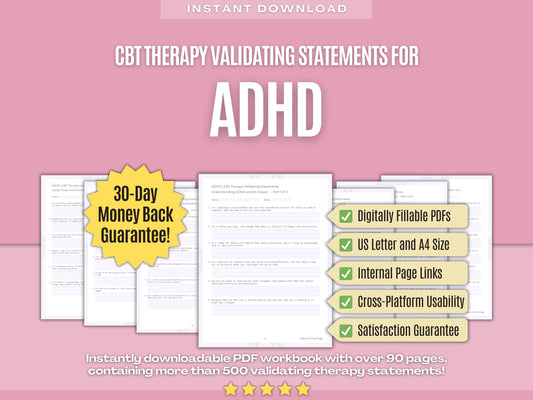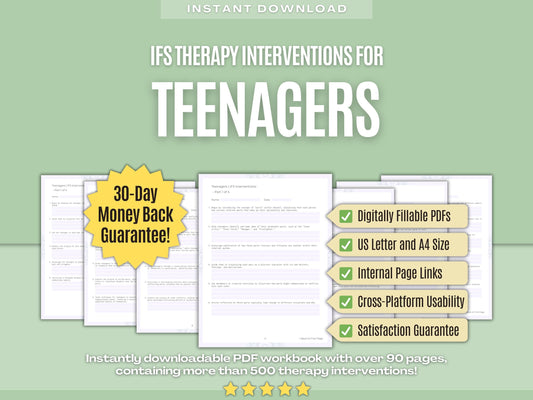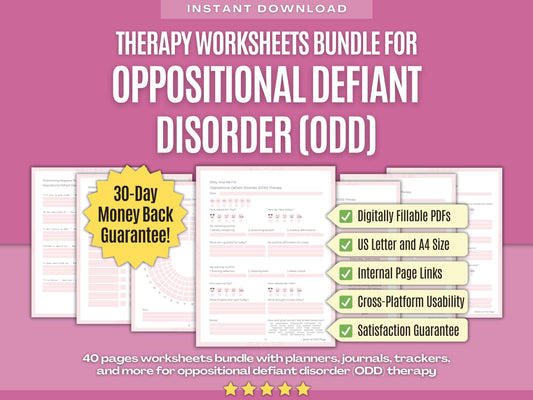Elevate Your Therapy and Guide Your Clients to Inner Healing with Our Anxiety Disorders Validating Therapy Statements! ✨
1. Starting Anxiety Therapy
- Embarking on anxiety therapy can feel daunting, but it's important to recognize the strength and courage it takes to prioritize your mental health.
- It's natural to experience a range of emotions as you start therapy, and I want to assure you that all of your feelings are valid and welcomed here.
- Anxiety therapy is a collaborative process, and together, we'll work towards understanding your triggers and developing coping strategies that work best for you.
- Your experiences with anxiety are unique to you, and I'm committed to creating a safe and supportive environment where you can explore and address them.
- Starting therapy can bring up a mix of emotions, including hope, fear, and uncertainty, and it's important to honor and explore each of these feelings in our sessions.
- Your experiences with anxiety are valid and deserving of attention, and I'm here to listen to your concerns without judgment or criticism.
- As we begin therapy, I encourage you to approach our sessions with an open mind and a willingness to explore new insights and perspectives.
- Your commitment to your own well-being is admirable, and I'm here to provide the support and guidance you need to navigate through your anxiety.
- Your experiences with anxiety are valid and deserving of attention, and I'm here to listen to your concerns without judgment or criticism.
- Therapy is a collaborative process, and your input and feedback are invaluable in guiding our work together towards your goals.
- It's okay to feel apprehensive or uncertain about what to expect from therapy, and I'm here to provide guidance and support as we navigate through this process together.
2. Anxiety Disorders Education
- It's important to understand that anxiety disorders are common mental health conditions that affect millions of people worldwide.
- Each type of anxiety disorder has its unique symptoms and challenges, but they all share a common thread of excessive worry and fear.
- It's crucial to recognize that anxiety disorders are not a sign of weakness or personal failure; they are legitimate medical conditions that require proper treatment and support.
- One of the hallmark features of anxiety disorders is persistent and excessive worry or fear about everyday situations or events.
- Avoidance behaviors are common among individuals with anxiety disorders, as they may try to avoid situations or triggers that provoke anxiety.
- Anxiety disorders often coexist with other mental health conditions such as depression, substance abuse disorders, and eating disorders.
- Anxiety disorders can be effectively treated with a combination of therapy, medication, lifestyle changes, and self-care strategies.
- Exposure therapy is another effective treatment approach for anxiety disorders, as it involves gradually exposing individuals to feared situations or triggers in a safe and controlled manner.
- Lifestyle changes such as regular exercise, healthy eating, adequate sleep, and stress management techniques can also help reduce symptoms of anxiety disorders.
- It's essential for individuals with anxiety disorders to seek professional help from qualified mental health professionals who can provide accurate diagnosis and appropriate treatment.
- Recovery from anxiety disorders is possible with proper treatment and support, and many individuals go on to lead fulfilling and productive lives.
3. Mindfulness for Anxiety
- Mindfulness can be a powerful tool for managing anxiety by helping you become more aware of your thoughts, feelings, and bodily sensations in the present moment.
- Mindfulness involves paying attention to the present moment with curiosity and acceptance, rather than dwelling on the past or worrying about the future.
- Mindfulness allows you to step back from your anxious thoughts and emotions, creating space to observe them with a sense of calm and detachment.
- Mindfulness is not about achieving a state of complete relaxation or clearing your mind of all thoughts; it's about cultivating a compassionate awareness of whatever arises.
- Mindfulness can help you develop a more balanced perspective on your anxiety, recognizing that it's just one aspect of your experience rather than the defining characteristic of who you are.
- Mindfulness can be practiced in various ways, including meditation, mindful breathing, body scans, and mindful movement such as yoga or tai chi.
- Mindfulness can help you develop a greater sense of acceptance towards your anxiety, allowing you to relate to it with kindness and understanding rather than resistance.
- Mindfulness can help you develop greater emotional resilience, enabling you to bounce back more quickly from stressful situations and setbacks.
- Mindfulness can help you break free from the cycle of rumination and worry that often accompanies anxiety, allowing you to experience greater peace and clarity of mind.
- Mindfulness can help you develop a deeper connection to yourself and the world around you, fostering a sense of gratitude and appreciation for the beauty of life.
- Mindfulness is not a quick fix for anxiety, but with consistent practice, it can become a valuable lifelong tool for managing stress and promoting overall well-being.
4. Dialectical Behavior Therapy (DBT) for Anxiety
- Dialectical Behavior Therapy (DBT) offers a comprehensive approach to managing anxiety by integrating strategies for emotion regulation, mindfulness, interpersonal effectiveness, and distress tolerance.
- DBT emphasizes the importance of balance and acceptance, helping you find a middle path between acceptance of yourself and the need for change.
- By practicing radical acceptance, you can reduce your resistance to uncomfortable emotions and situations, allowing you to approach them with greater calm and clarity.
- Through mindfulness practice, you'll learn to observe your thoughts and emotions without getting caught up in them, creating space for wise and intentional action.
- Distress tolerance skills are another important aspect of DBT, teaching you how to cope with crises and intense emotions without making the situation worse.
- Interpersonal effectiveness skills taught in DBT can help you navigate challenging social situations and build more satisfying and supportive relationships, which can in turn reduce anxiety.
- It's important to approach DBT with an open mind and a willingness to engage in the process of self-discovery and growth, even when it feels challenging or uncomfortable.
- Throughout our sessions, I'll be here to provide guidance, support, and encouragement, helping you navigate any challenges that arise along the way.
- In DBT, we'll work together to identify specific goals for therapy and develop a personalized treatment plan tailored to your unique needs and circumstances.
- DBT offers practical skills and techniques that you can use outside of therapy to manage your anxiety more effectively in real-life situations.
- DBT provides hope for a brighter future free from the grip of anxiety, and I'm honored to be a part of your journey towards greater peace and fulfillment.
5. Interpersonal Therapy (IPT) for Anxiety in Relationships
- Interpersonal Therapy (IPT) offers a focused and time-limited approach to addressing anxiety within the context of relationships by exploring the ways in which your interactions with others may contribute to your anxiety symptoms.
- IPT recognizes that our relationships with others can have a significant impact on our mental health and well-being, and by improving these relationships, we can reduce anxiety symptoms and improve overall quality of life.
- One of the key principles of IPT is that our relationships with others are influenced by a range of factors, including communication styles, attachment patterns, and life transitions.
- It's important to approach IPT with an open mind and a willingness to explore how your relationships may be impacting your anxiety symptoms.
- Throughout our sessions, I'll be here to provide guidance, support, and encouragement, helping you navigate any challenges that arise in your interpersonal relationships.
- In IPT, we'll work together to identify specific goals for therapy and develop a plan of action to address your interpersonal issues and reduce your anxiety symptoms.
- It's important to approach IPT with patience and self-compassion, recognizing that change takes time and effort but is entirely achievable with dedication and persistence.
- It's okay to have doubts or skepticism about IPT, but I encourage you to approach it with an open mind and a willingness to explore its potential benefits for yourself.
- By investing in IPT for your anxiety, you're investing in your long-term well-being and happiness, and I'm here to support you every step of the way.
- I want to commend you for your courage and willingness to engage in IPT for your anxiety. Your dedication to your own well-being and your relationships is truly inspiring, and I'm here to support you in any way I can.
- By working together to implement IPT strategies, you'll develop healthier and more fulfilling relationships, paving the way for reduced anxiety and improved overall quality of life.
6. Emotion-Focused Therapy (EFT) for Anxiety
- Your emotions are a vital part of your experience, and it's important to honor and explore them in our therapy sessions.
- Your emotions provide valuable clues about your inner world and the underlying causes of your anxiety.
- Your emotional experiences are complex and multifaceted, and it's okay to feel a range of emotions as we work through your anxiety.
- Your emotions are not something to be judged or suppressed but rather understood and processed.
- I want to acknowledge the courage it takes to confront and explore your emotions in therapy.
- Your emotional experiences are unique to you, and they deserve to be acknowledged and validated.
- Your emotions serve as important messengers, signaling areas of your life that need attention and care.
- Your emotions are not a sign of weakness but rather a reflection of your humanity and sensitivity.
- I want to validate the strength it takes to sit with uncomfortable emotions and explore them in therapy.
- Your emotional responses are valid and important, and I want to create a safe space for you to express them freely.
- I want to validate the complexity of your emotional experiences and the role they play in shaping your anxiety.
7. Psychodynamic Approaches for Deep Anxiety Issues
- Your anxiety is a significant indicator of deeper emotional conflicts and unresolved issues that we can explore together.
- Your anxiety symptoms may be manifestations of unconscious processes that we can work to uncover and understand in therapy.
- Your anxiety narrative provides valuable insights into the internal struggles and conflicts that may be contributing to your distress.
- Your anxiety may be connected to early childhood experiences or past traumas that continue to influence your thoughts and behaviors.
- Your anxiety symptoms may serve as defenses against deeper, more painful emotions that are difficult to acknowledge or express consciously.
- Your anxiety may be intertwined with unconscious patterns of relating to yourself and others that we can work to uncover and address.
- I hear the distress underlying your anxiety symptoms, and I'm here to help you navigate and make sense of it.
- It's important to approach your anxiety with curiosity and compassion, recognizing that it may be a manifestation of deeper psychological processes.
- Your anxiety symptoms may be attempts by your unconscious mind to communicate distress or unmet emotional needs that require attention.
- Your anxiety may be serving as a protective mechanism to shield you from re-experiencing painful emotions or traumatic memories from your past.
- Your anxiety is not a sign of weakness but rather a reflection of the depth of your emotional experiences and the challenges you've faced.
8. Music Therapy for Soothing Anxiety
- Your connection with music as a source of comfort and solace is a valuable resource we can tap into to help soothe your anxiety.
- Your ability to find refuge in music during times of anxiety demonstrates your resilience and adaptive coping skills.
- Your musical preferences and choices provide valuable insights into the types of sounds and rhythms that resonate with you on a deep level.
- Your relationship with music is unique and personal, and it's important to honor and respect the ways in which it supports your well-being.
- Your ability to use music as a coping mechanism demonstrates your resourcefulness and creativity in managing your anxiety.
- Your musical preferences may change depending on your emotional state, and that's okay—it's all part of the dynamic nature of your relationship with music.
- I hear the significance of certain songs or melodies in your life, and I'm here to explore how they can be used to support your anxiety management efforts.
- It's important to approach music with curiosity and openness, allowing yourself to be guided by its rhythms and melodies as you navigate through anxiety.
- Your ability to use music to create a sense of calm and relaxation is a valuable skill that can be cultivated and refined over time.
- Your relationship with music is deeply personal and meaningful, and it's okay to seek comfort and solace in its melodies during times of distress.
- Your musical experiences have the power to evoke memories, emotions, and sensations that can help you to navigate through anxiety with greater ease.
9. Concluding Anxiety Therapy Sessions
- As we conclude our therapy sessions, I want to acknowledge the progress you've made in managing your anxiety and the dedication you've shown to your healing journey.
- It's important to recognize that therapy is just one part of your journey, and the insights and skills you've gained here will continue to serve you well beyond our sessions.
- Your willingness to explore difficult emotions and challenge unhelpful thought patterns is a testament to your strength and resilience.
- I want to reassure you that setbacks and relapses are a normal part of the healing journey, and they provide valuable opportunities for growth and learning.
- It's important to recognize the changes you've made, both internally and externally, as you've worked to manage your anxiety more effectively.
- Your insights into your triggers and coping mechanisms have empowered you to take greater control over your anxiety and live a more fulfilling life.
- I want to assure you that the skills and strategies you've learned in therapy will continue to serve as valuable tools for managing anxiety in your daily life.
- It's important to recognize the resilience and inner strength you've demonstrated in the face of anxiety, and to continue honoring and nurturing those qualities moving forward.
- Your journey with anxiety has undoubtedly been challenging, but it has also been an opportunity for growth, self-discovery, and transformation.
- I want to reassure you that the insights and skills you've gained in therapy are yours to keep, and you can draw upon them whenever you need support in managing anxiety.
- It's important to acknowledge the support systems and resources available to you as you navigate life after therapy, including friends, family, and ongoing self-care practices.
10. Final Reflections on Anxiety Management
- As we reflect on your journey with anxiety management, I want to acknowledge the courage and resilience you've shown in confronting and overcoming your fears.
- It's important to recognize that managing anxiety is not an easy feat, and the progress you've made is a testament to your hard work and dedication to your well-being.
- Your willingness to seek help and engage in therapy demonstrates your proactive approach to managing your anxiety and investing in your mental health.
- I want to reassure you that healing from anxiety is a journey, and it's normal to experience ups and downs along the way.
- It's important to acknowledge the support systems and resources that have helped you along the way, whether it's therapy, medication, supportive friends and family, or self-care practices.
- Your journey with anxiety has likely taught you valuable lessons about yourself, your strengths, and your resilience, and I want to honor those insights and experiences.
- I want to reassure you that it's okay to ask for help and support when you need it, and to continue reaching out to your support network as you navigate life's challenges.
- It's important to remember that self-compassion is key in managing anxiety, and to treat yourself with kindness and understanding as you navigate your emotions.
- Your journey with anxiety management has likely involved stepping out of your comfort zone, trying new things, and facing uncertainties, and I want to commend you for your bravery in doing so.
- I want to reassure you that it's okay to have moments of doubt or insecurity, and to remember that you have the strength and resilience to overcome any challenges that come your way.
- It's important to recognize that healing from anxiety is a holistic process that involves addressing physical, emotional, and psychological factors, and I want to commend you for your commitment to your overall well-being.
We hope that our validating therapy statements for Anxiety Disorders therapy will help you to elevate your therapy practice and guide your clients to inner healing! Do you need more validating therapy statements for Anxiety Disorders therapy? Find them all in our Digital Workbook! Or do you have any questions or suggestions for us? Please feel free to contact us at any time!


















